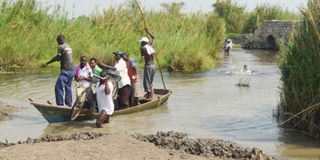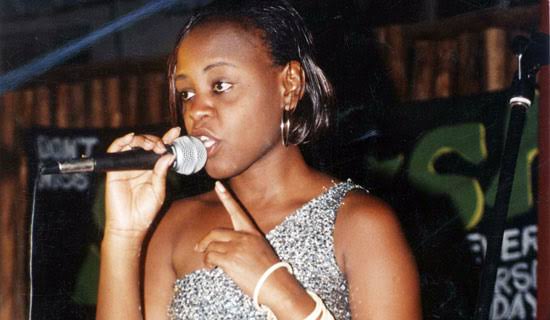Prime
Ntoroko, where rain and sunshine are not welcome

Residents use boats to access their gardens. Pupils are worried about access to schools as the term opens. Photo by Edgar R. Batte.
What you need to know:
For the cattle-keeping communities of Ntoroko, nothing disturbs their peace like floods when rains come and fill River Semliki, their main source of livelihood. However, not even the sunshine is welcome as it also scotches their animals’ pasture and they have to move to far away places to keep their herds alive.
To say life in Budiba village in Butungama Sub county in the new district of Ntoroko is harsh, is an understatement. When you live there, you do not want to ask God for rain or sunshine because both can be a curse.
Budiba is one of the villages still battling the floods from the December rains. The rains make River Semliki explode now and then, flooding three sub counties of the district which was recently curved out of Bundibugyo, in western Uganda.
In the last one year, the river has burst twice; in August and December, taking two lives and displacing 17,000 people in Bweramure, Butungama and Rwebisengo the sub counties. Their homes were swept downstream, and few others submerged in the floods that also destroyed gardens, and domestic equipment, and of course pasture for the animals.
This is not the first time it is happening. Floods happen every other year in the rainy season, but, the kind of floods that came in 2012, are only comparable to the ones of 1911, 1962, 1988, according to elders in the area.
World Vision assessment puts 895 households as severely affected.
Mr Moses Muhigi of Budiba village, Butungama Sub County, who we found sitting under a tree shade with his family, looking at their makeshift shelter, is not one of those assessed as severely affected.
But he has 11 children and two wives. The whole time we were there, his younger wife looked at us without saying a word but breastfeeding her baby of about five months.
Muhigi’s first wife was preparing lunch of cassava leaves, which she says, would be eaten with rice that she buys at the shop in Budiba at Shs4,500 a kilogramme.
Their home was washed away by floods, and only a handful of property including a goat with three young ones, chicken, a dog, and a cat were saved. Their lives hang on a thread because they cannot feed themselves – let alone their animals.
The river, on which Muhigi depends on as fisherman, flows out of eastern Congo, which is located on a higher altitude than Ntoroko, which is largely a plain at the foot of the imposing Rwenzori Mountain ranges.
When it rains in Congo and Bundibugyo, Ntoroko suffers. The waters in Semliki River rise, like it happened in the months between July and December last year, and fishing goes on recess.
Ntoroko is a district without permanent offices of its own and still uses a school administration block at Kibuku Primary School, in Kibuku Town Council as headquarters. When the district council meets, they sit under a tree, for there is no where else to meet.
Mr Emmanuel Were, Bundibugyo World Vision’s acting programmes manager says, they are trying to look out for long term solutions to the problems affecting these people.
“Flooding has increasingly become a recurrent problem in the areas around the Semliki,” Mr Were, who has overseen the disaster response to over 580 households, said.
World Vision has offered to develop capacity for Ntoroko District to respond to disasters, on top of giving out tarpaulins, plates, cups, saucepans, soap, blankets and water purifying tablets.
The new local government does not have a disaster management committee to do surveillance, prediction and respond to emergencies like floods, says Mr Were.
“As an organisation, we prefer building capacity in the area to prevent problems before they arise,” he said.
More than 17,000 people were affected by the floods last year, and with the river threatening, each year, this kind of problem can grow bigger.
River Semliki that runs from DR Congo, through the Rwenzori Mountains down into Lake Albert is the border landmark separating Uganda and DRC.
And because the side of Congo is on high altitude, forested and receives lots of rains, and the side of Uganda is in the lowlands, plain and without forest cover, the river, which is the main source of livelihood for the largely pastoralist communities, is rather treasonous when it rains either in the Congo or Ugandan areas around Bundibugyo and Ntoroko itself.
Not first time
The floods have left the people poor.
Animals have no pasture because the water covered the grass, and since it started shining about three weeks ago, already, what is left is starting to dry away.
About 30 per cent of the population in Ntoroko are pastoralists who depend entirely on their cattle for a livelihood.
The rest are fishermen who mix their trade with a little agriculture, growing cassava, matooke and mangoes along the river banks.
But, agriculture is not a lifestyle here and great chunks of land are only used for grazing.
World Vision have started a programme where they help the homesteads grow their own food, Mr Were says.
“It is not sustainable to sell animals to buy food,” he adds.
They have to contend with protecting their crop from cattle by erecting fences. However, cassava gardens when not affected by floods, do well especially those seen during this trip at Bweramure, Butungama and Rwebisengo sub counties. But when it floods, nothing is spared. Gardens are submerged, much as fishermen suspend their activities and cattle keepers relocate to lands where they can keep their animals safe and find pasture.
Sunshine too is not welcome
One might say the rains are the problem, but in Ntoroko, the sunshine is not necessarily a blessing.
Ibrahim Baluku, the district information officer says the water tables go so low during the dry season that both animals and people have no water to feed. Boreholes go dry. And so do the wells. The only source of water then, is the Semliki River, which in the local dialect, Butuku, means, “There is nothing”.
The sun causes suffering to residents here, just as the rains. Baluku says the minister of animal husbandry, Bright Rwabirama, advised them when he visited last year to sell their local breeds, purchase fewer but high-value exotic animals, and settle down. “He advised them to sell milk,” says Mr Baluku.
Edson Komuntara, the Bweramuri Sub County’s chairman, says was good advice, but his people are not used to selling milk, but, cattle themselves.
He says it will take time before they can embrace the new practice.
Komuntara says, the culture of the place values numbers, and the more cattle one has, the wealthier he or she is regarded.
But with animals and people competing for resources, and the soil left barren, and floods coming now and then, he contends, the way forward is going after quality animals, and not quantity.
Health
The state of health in this district is not inviting. Malaria is prevalent, and with homes swept away, children and pregnant women, are exposed to a harsh climate, mosquito bites due to stagnant waters and poor feeding.
Susanna Wataka, a mother of 12, has given birth to only two children in the health facility. She blames this on distances and costs involved.
“God helps us and we deliver safely at home, even by ourselves,” she says boastfully, unaware of how dangerous that is. Waterborne diseases like diarrhoea, typhoid, and cholera are common and spread due to the overflowing of toilets that contaminate water sources.
But like Lawrence Otyek, the western regional operations manager for World Vision, said, while handing out relief items, only mosquito nets can protect children and pregnant women from malaria coming off mosquitoes bred by the stagnant waters. “Give priority to children and pregnant women when you receive nets,” he appealed to the recipients.
That said, the problem of family planning remains. For Augustine Mugisha, who has 13 children, not even the three nets he got from the handouts, can cover half his household.
And to make matters worse, there is only one medical doctor in the district, who also doubles as the district’s medical officer, which means most of the time, he spends it on administrative work.
Education
It is the same situation with education. Muhereza Kajumba, one of the women who received handouts from World Vision says, though she is glad that she can rebuild her homestead again with the donations, she worries for her children, who cannot go to school because floods cut them off very often. She is a mother of 13.
Another mother, Christine Kiiza, says, “My children cannot attend school due to the long distances to school.”
The mother of five says because of the floods, the distances have even become longer. The nearest school to her home is not less than seven kilometres, but her children have to walk all the miles to and fro, to get an education.
A double edged sword
Semliki will remain both a source of livelihoods and suffering in Bundibugyo and Ntoroko.
Christopher Nyakaana, Budiba parish local council chairman says because the land is communally owned, it is difficult to move from one area to another because the other community may not welcome them, especially because there is competition over pasture for the animals.
He added that sometimes people die because they cannot move with their animals to another area and they keep on their land despite warnings of impending floods.
However, Omuhereza Ruhweza, the LC3 chairman Butungama says the time has come for the government to carry significant programmes in the area to avert the risks the river poses. He said the reoccurrence of the floods every other 20 years, expose the population to poverty, because they are not settled, and are always on the move.
Baluku says two people died in the September floods. But more may die in the future if practical solutions are not found.




